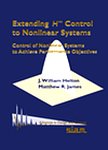版权所有:内蒙古大学图书馆 技术提供:维普资讯• 智图
内蒙古自治区呼和浩特市赛罕区大学西街235号 邮编: 010021

丛 书 名:Advances in Design and Control
版本说明:SIAM
I S B N:(纸本) 9780898714401
出 版 社:Society for Industrial Mathematics
出 版 年:1999年
主 题 词:H-infinity control nonlinear control theory information states factorization time varying systems
馆 藏 号:201726410...
摘 要:H∞ control originated from an effort to codify classical control methods, where one shapes frequency response functions for linear systems to meet certain objectives. H∞ control underwent tremendous development in the 1980s and made considerable strides toward systematizing classical control. This book addresses the next major issue of how this extends to nonlinear systems. At the core of nonlinear control theory lie two partial differential equations (PDEs). One is a first-order evolution equation called the information state equation, which constitutes the dynamics of the controller. One can view this equation as a nonlinear dynamical system. Much of this volume is concerned with basic properties of this system, such as the nature of trajectories, stability, and, most important, how it leads to a general solution of the nonlinear H∞ control problem. The second PDE actually builds on a classical type of partial differential inequality (PDI) called a Bellman-Isaacs inequality. While the information state PDE determines the dynamics of the controller, the PDI determines the output of the controller. The authors explore the system theoretic significance of the PDI and present its gross structure. These equations are only a few years old and their study is an expanding area of research. This book also emphasizes the theory effecting computer solvability of the information state equation, which at the outset looks numerically intractable, but which surprisingly is in many cases tractable. For example, the theory shows that careful initialization has a major influence on computer solvability. The authors keep the book self-contained by using the appendices to help explain certain prerequisite material. The reader should have a basic knowledge of control theory, real analysis and differential equations, nonlinear operator theory, and nonlinear PDEs.